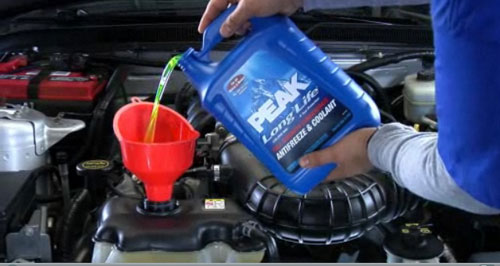Quite a large number of modern motorists do not attach importance to what composition is used to cool the engine of their favorite car. There are still people who thought lightly: all coolants (coolant) work approximately equally.

Meanwhile, the choice of coolant for the engine is a very important task, because not only the engine’s trouble-free operation, but also its efficiency and durability depend on its correct solution. Coolants on the market of our country can be divided into two main groups: antifreeze and antifreeze. How does antifreeze differ from antifreeze and what variations of these liquids are on the market - we will tell about this in this article.
What is a coolant?
The basis of any coolant is water and ethylene glycol (propylene glycol can be used very rarely). Adding alcohol in a volume of 50% -60% allows you to increase the boiling point and lower the freezing point of the solution. However, for the full coolant of these components is not enough.
A number of special additives are needed to protect the parts and the engine body from corrosion, as well as improve the functionality of the coolant. It is in the composition of these same additives, or additives, which is a more correct name, and is the difference between the coolant produced by various manufacturers.
Antifreeze and antifreeze: what is the difference?
Antifreeze is a coolant containing inorganic acid salts as corrosion inhibiting additives:
- nitrites;
- nitrates;
- silicates;
- borates;
- amines;
- phosphates.
Technology of production of Tosol is considered obsolete, in developed countries, such coolants are not produced.
More progressive development is antifreeze: it is a coolant, the additive complex of which is formed by salts of organic acids with the common name “carbonates”. Because of the fact that additives belong to this group, antifreeze is often called carboxylate coolant.

In addition to these differences, there is one more that even a novice car enthusiast will immediately indicate. The idea is that antifreezes and antifreezes produced by different brands have a different color. Many, in bewilderment, ask the question: how, for example, does blue antifreeze differ from red, and how does green antifreeze differ from blue?
We declare with all responsibility: coloring of the coolant does not affect its performance in any way and is not worth your attention. It is the result of the addition of dye, which coolant manufacturers are trying to distinguish their products among all others. Of course, red antifreeze is different from green, but the difference is not in the appearance of the liquid, but in its performance.
Antifreeze and antifreeze: which is better?
The answer to this question will be unequivocal: antifreeze. Here are its advantages:
- High cooling efficiency.
Antifreeze differs from antifreeze in that it forms a half-millimeter protective film on all surfaces with which it comes into contact. This film plays the role of "fur coat", which impairs heat dissipation. Antifreeze form a similar film only in those areas that are susceptible to corrosion. - Long service life without loss of protective properties.
Additives in antifreeze consumed smoothly, whereas in antifreeze, this process occurs quickly and unevenly. - Aluminum protection at high temperatures.
In new cars, aluminum is becoming more common, for its protection while heating, antifreeze is of little use. - Sparing mode of operation of the water pump.
Due to the composition of carboxylate antifreeze, the blades of the water pump are less susceptible to the effects of hydraulic shocks due to cavitation, which prolongs its service life by 50%. - Protection of cylinders against cavitation.
- Stable chemical composition.
During operation, the components of the antifreeze can form gels or insoluble compounds that precipitate and clog the cooling system. Antifreeze is free from this drawback. - Compatible with plastic or rubber seals.
Even this, far from complete, list of benefits of carboxylate antifreeze looks quite impressive, so the choice between antifreeze and antifreeze is obvious. In order to choose the right antifreeze for your car, study the recommendations of the automaker. As a rule, they are given in the instructions for the car.
It will be interesting to friends too

